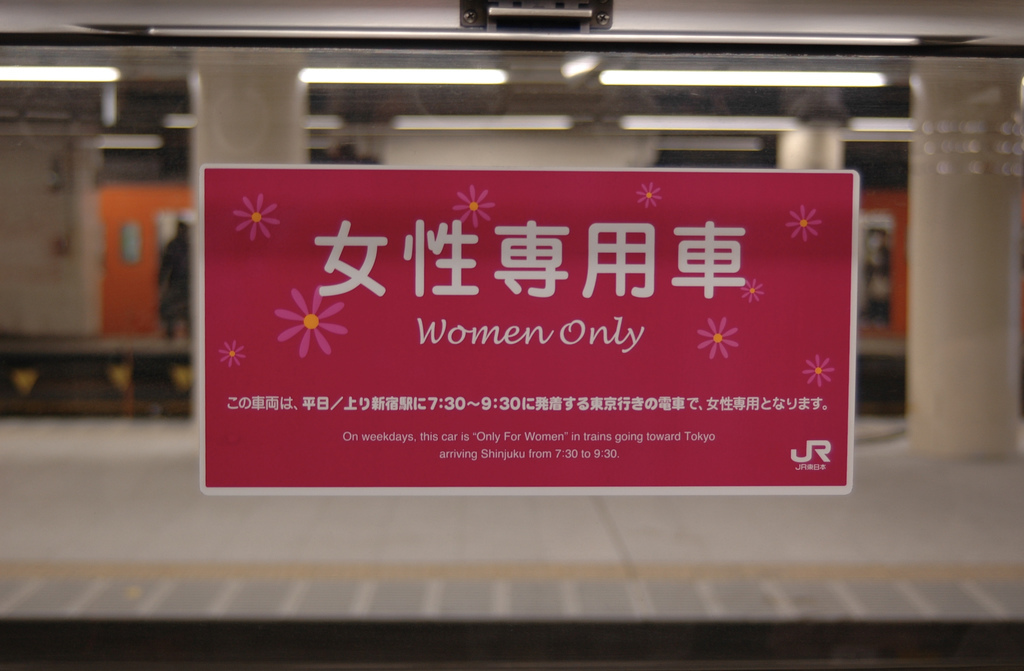In the World Economic Forum‘s 2014 Gender Gap Index, Japan ranked 104th out of 142 countries, with pay disparity at 64% – the highest in the developed world. Try and start a conversation about feminism in Japan and the responses are often confusing — a lot of the women I speak to do not identify as feminists or think feminism is useful. One curator tells me, “I don’t think it’s important to say loudly women are equal — women have special powers that men do not.” Another young woman says she is “not a loud feminist, it’s often embarrassing being feminist in Japan.” She’s right. The Japanese equivalent to Sandi Toksvig, politician Nobuko Iwaki, always appears wearing a pink suit and is openly mocked for her views. So why would anyone want to make themselves vulnerable to attack by identifying as a feminist?
The current Japanese government is hardly trying to change things; it is as male-dominated as the cabinet in the UK. Yoshihide Suga, the government’s top spokesman, recently appeared on television proudly stating: “I am hoping that mothers will contribute to their country by feeling like they want to have more children. Please have many children.” Taro Aso, Japan’s deputy prime minister had something equally damaging to say: “Many people have created the image that elderly people are to blame for escalating social security costs in Japan, but refusing to give birth is a more serious problem.” Talk about women’s rights here and men will talk about reproduction.
Masayo, a Tokyo-based artist, confirms these sentiments are echoed by the public: “Friends of my mother say getting married early is good. I’m surprised how many people are concerned with my personal life plans.” Chycca from Osaka adds, “When I turned 25, my family asked ‘Where is your husband? Where is your baby?'” Depopulation scares the patriarchy and women are being blamed for the 30% population decline projected by 2060. A male journalist in Kanazawa tells me, “We already know women are unequal — what about population?” Arguing that the world is already sufficiently populated, I explain that the piece I’m writing isn’t about me, I’m using my agency as the revered, (perceived) cis-white-male to create a platform for Japanese women’s thoughts to be heard. It falls on deaf ears.
With all these thoughts buzzing around my head, I jump on the train, where women-only carriages operate across the Tokyo transport system, to prevent men taking covert images of them. There is no escaping gender inequality in Japan. “Upskirting” has become such a problem that any phone with a camera sold in Japan cannot silence the shutter sound. I ask my friend and Tokyo resident, Sophie, if this solved the problem. “Unfortunately not,” she says. “You can now pay to grope women in mock train carriages in sex clubs.”
Rokude Nashiko, an artist using Japanese taboo to her advantage has created a series of works challenging Japanese attitudes towards women’s sexuality with toys modeled on her vagina — most recently she made a 3D kayak of her lady bits. But, as the Japanese proverb says, “the stake that sticks out will be hammered down”, and Nashiko was imprisoned and put on trial for breaching public decency laws. Is it all doom and gloom? Well, no. It would, of course, be unfair to say Japanese women are living in the dark ages, nor is it right to say all women here are anti-feminist.
Despite the fear cases like Nashiko’s create, women do enjoy a very Japanese sexual freedom. “Boylove” is anime soft porn created by women for women that often depicts famous TV stars, like Benedict Cumberbatch’s character from the BBC’s Sherlock, engaging in homosexual love-making. In Tokyo’s Geek Town, I found mothers and daughters searching for their favorite boylove anime comics together – Japan is full of brilliant contradictions.
Bored of male-dominated power, some girls are ditching their real-life boyfriends for online ones. Webkare is a dating simulation platform where all the boys are soft, kind, caring and made of pixels. They’ve been so successful they now have 3.5 million users each day. Perhaps it’s this that has given birth to the newly formed breed of “modern man” that’s emerging. Known in Japan as “herbivore men”, these 20-somethings are men who have no traditional expectations of their partners and who believe in equality. These are the next generation of men who could see Japan turn into a more equal society.
So is Japan more or less feminist than the west? Well, Japanese feminism is different. It’s less focused on individual autonomy and more concerned with collective social harmony. So what if it’s not loud enough or radically activist enough for our western palette. Perhaps it doesn’t have to be?
Credits
Text Scottee
